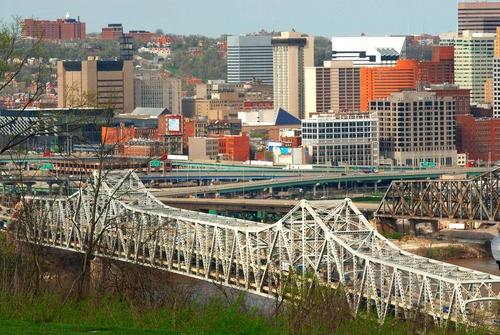
President Joe Biden and Transportation Secretary Pete Buttigieg announced Tuesday the recipients of the administration’s new National Infrastructure Project Assistant (Mega) discretionary grant program.
The new Mega grant program will provide $1.2 billion in discretionary funds to nine large infrastructure projects across the country.
“From the Hoover Dam to the Golden Gate Bridge, some infrastructure projects are so large and complex that they defy traditional funding systems—and so significant that they become iconic parts of the American landscape,” Buttigieg said. “After receiving over one hundred applications, we are proud to fund these nine infrastructure megaprojects across the country to create jobs, strengthen our supply chains, expand our economy, and renew America’s built landscape.”
The grants include $250 million for improvements to the Brent Spence Bridge between Cincinnati, Ohio, and Covington, Ky. The grant will support improvements to the bridge and fund the construction of a new bridge beside the existing one to relieve congestion and improve travel time reliability. Addition funding includes $292 million for the Hudson Yards Concrete Casing project in New York, N.Y., which will help fund the final section of concrete casing needed to preserve the future right-of-way for the new Hudson River Tunnel; $150 million for the Calcasieu River Bridge in Calcasieu Parish, La., that will build a new bridge to replace the existing bridge to relieve congestion and improve regional mobility and supply chain efficiency; and $110 million for North Carolina’s Alligator River Bridge in Dare and Tyrrell counties in N.C., to construct a new modern high-rise fixed span bridge to replace the existing machinery-driven movable swing bridge.
Four of the nine grants will go toward critical public transit and passenger rail projects in California, Illinois, New York, and Pennsylvania. The American Public Transportation Association (APTA) applauded the investment in public transportation.
“Providing the necessary investment to modernize our public transit and passenger rail systems will allow agencies across the country to meet growing community demands for increased mobility choices that will reap economic and environmental benefits nationwide,” said APTA President and CEO Paul P. Skoutelas. “These historic investments in our country’s public transportation infrastructure will enable our communities to provide access to opportunities and create family-wage jobs, advance equity, and tackle climate change.”
As part of the Infrastructure Investment and Jobs Act, the Mega program will invest $5 billion through 2026 to rebuild America’s infrastructure. For this application cycle, the U.S. Department of Transportation received applications for nearly $30 billion, far exceeding the $1 billion in grants available in 2022.